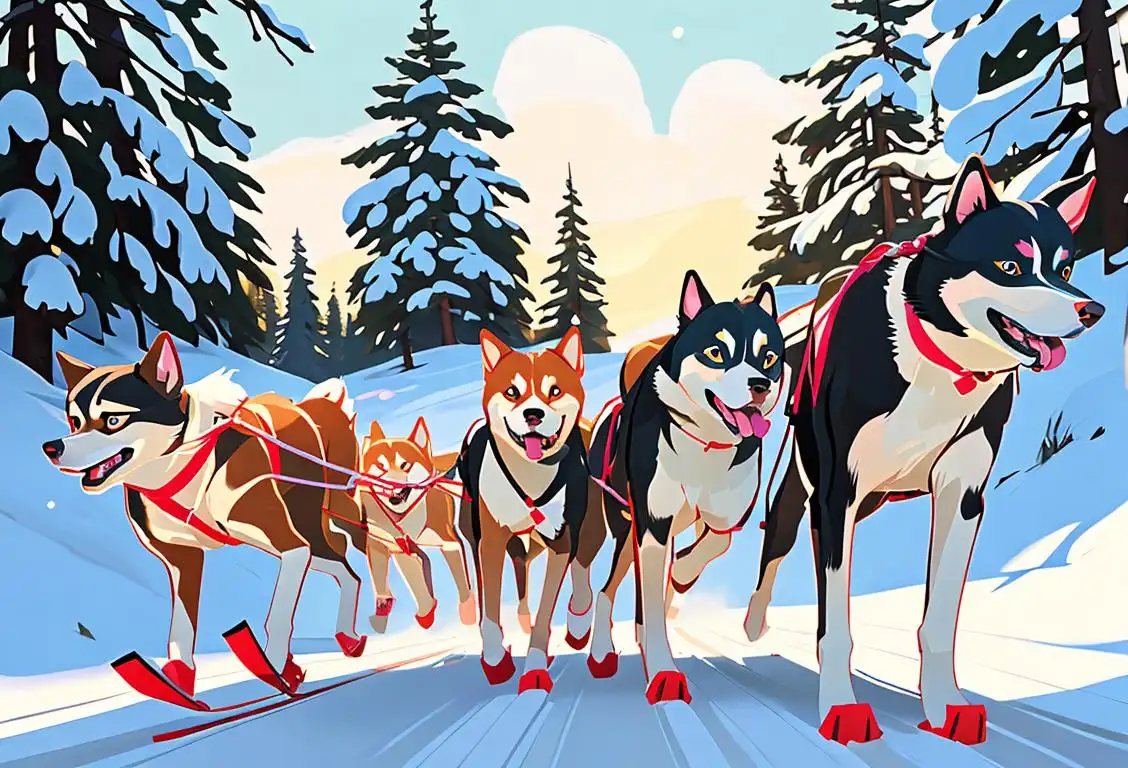National Sled Dog Day

Hey there, dog lovers! Get ready to celebrate National Sled Dog Day, a paw-some day dedicated to those amazing furry athletes who pull us along effortlessly through snow and ice. So grab your mittens, bundle up, and let's dive into the fascinating world of sled dogs!
When is Sled Dog Day?
It's national sled dog day on the 2nd February.
The History of National Sled Dog Day
Did you know that sled dogs have been around for thousands of years? Yup, these talented canines have been helping humans travel across snowy terrains since ancient times. Native communities in Arctic regions heavily relied on these incredible creatures for transportation, hunting assistance, and even as loyal companions.
The tradition of celebrating sled dogs came into the spotlight with the incredible story of Balto and his team of heroic sled dogs. In 1925, a deadly diphtheria outbreak hit the isolated town of Nome, Alaska, cutting off the supply of life-saving serum. With no other means of transportation available, a relay of brave sled dog teams, led by Togo, Balto, and others, was formed to deliver the serum over 674 miles of treacherous terrain. Thanks to their unwavering determination, the serum arrived in time, saving countless lives and cementing the status of sled dogs as true champions.
Fast forward to modern times, and sled dog racing has become a popular sport that showcases the incredible strength, agility, and endurance of these magnificent creatures. Events like the famous Iditarod Trail Sled Dog Race in Alaska attract mushers and dog teams from all over the world, competing in a grueling trek across frozen landscapes.
How to Celebrate National Sled Dog Day
Now that you're filled with the history of these amazing animals, it's time to celebrate National Sled Dog Day in style! Here are a few ways you can participate:
- Visit a sled dog kennel: Take a trip to a local sled dog kennel and meet these furry athletes in person. You'll be amazed by their strength and friendliness. Plus, cuddles are usually included!
- Read up: Indulge yourself in some fascinating books or articles about sled dogs and their adventures. It's a great way to learn more about their incredible abilities and the bond they share with their mushers.
- Donate to sled dog organizations: Show your support for sled dogs by donating to organizations that care for and advocate for these incredible animals. Your contribution can make a huge difference in their lives.
Did You Know?
Did you know that sled dogs have different positions within a team? The lead dog sets the pace and follows commands, while the swing dogs assist in steering the sled. The team dogs provide the main power, and the wheel dogs help with stability and turning. It's a well-orchestrated ensemble of canine talent!
History behind the term 'Sled Dog'
1903
The Beginnings
In 1903, the term 'sled dog' first appeared in popular culture. It referred to dogs that were specifically bred and trained to pull sleds in snowy and icy conditions. These dogs played an essential role in transportation, assisting humans in traversing vast distances, especially in Arctic and Subarctic regions where other means of transportation were limited.
1908
The Great Race
The term 'sled dog' gained widespread recognition in 1908, with the historic first All Alaska Sweepstakes race. This legendary dogsled race covered 408 miles from Nome to Candle and back, making it the longest dogsled race at the time. The race showcased the incredible stamina and strength of sled dogs and captivated the public's imagination.
1925
The Serum Run
One of the most significant events in sled dog history took place in 1925 - the heroic serum run to Nome. When an outbreak of diphtheria threatened the remote town of Nome, a relay of sled dog teams transported vital antitoxin serum to save lives. This amazing feat showcased the importance and capabilities of sled dogs, elevating their prominence even further.
1932
The Winter Olympics
In 1932, sled dog racing made its debut as a demonstration sport at the Winter Olympics in Lake Placid, New York. This event exposed sled dog racing to a global audience and solidified the term 'sled dog' as a recognized sport and cultural phenomenon. The thrilling races and intense competition only added to the allure of sled dogs.
1994
Establishing the Iditarod
The establishment of the Iditarod Trail Sled Dog Race in 1973 further propelled the popularity of sled dogs. This grueling annual long-distance race covers approximately 1,000 miles from Anchorage to Nome, following parts of the historic Iditarod Trail. The Iditarod became synonymous with the term 'sled dog' and drew international attention to the endurance and teamwork of these remarkable canine athletes.
Did you know?
Did you know that sled dogs have different positions within a team? The lead dog sets the pace and follows commands, while the swing dogs assist in steering the sled. The team dogs provide the main power, and the wheel dogs help with stability and turning. It's a well-orchestrated ensemble of canine talent!Tagged
awareness fun memories sportsFirst identified
2nd February 2016Most mentioned on
2nd February 2016Total mentions
51Other days
Arsenal Day
Sled Dog Day
Left Handers Day
Fitness Day
Foundation Day
Cancer Survivors Day
Memorial Day
Dance Day
Gymnastics Day
Golf Day








